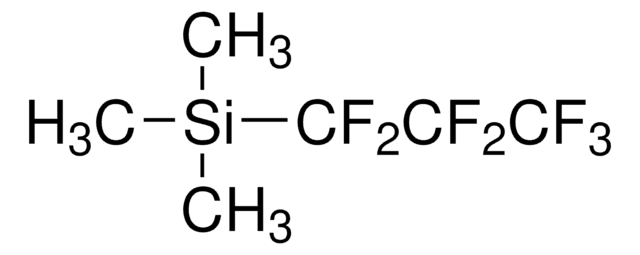729965
1H,1H,2H,2H-Perfluorododecyltrichlorosilane
97%
Synonym(s):
3,3,4,4,5,5,6,6,7,7,8,8,9,9,10,10,11,11,12,12,12-Heneicosafluorododecyltrichlorosilane
About This Item
Recommended Products
Quality Level
Assay
97%
form
solid
mp
50-55 °C
SMILES string
FC(F)(F)C(F)(F)C(F)(F)C(F)(F)C(F)(F)C(F)(F)C(F)(F)C(F)(F)C(F)(F)C(F)(F)CC[Si](Cl)(Cl)Cl
InChI
1S/C12H4Cl3F21Si/c13-37(14,15)2-1-3(16,17)4(18,19)5(20,21)6(22,23)7(24,25)8(26,27)9(28,29)10(30,31)11(32,33)12(34,35)36/h1-2H2
InChI key
ZFUVZJADECZZMS-UHFFFAOYSA-N
General description
Application
Signal Word
Danger
Hazard Statements
Precautionary Statements
Hazard Classifications
Eye Dam. 1 - Skin Corr. 1B
Storage Class Code
8A - Combustible corrosive hazardous materials
WGK
WGK 3
Flash Point(F)
Not applicable
Flash Point(C)
Not applicable
Choose from one of the most recent versions:
Already Own This Product?
Find documentation for the products that you have recently purchased in the Document Library.
Customers Also Viewed
Articles
Inorganic nanomaterials are tunable by size, shape, structure, and/or composition. Advances in the synthesis of well-defined nanomaterials have enabled control over their unique optical, electronic, and chemical properties stimulating tremendous interest across a wide range of disciplines. This article illuminates some of the recent research advances of inorganic nanoparticles (NPs) in optoelectronics applications.
Global Trade Item Number
| SKU | GTIN |
|---|---|
| 729965-1G | 4061826207864 |
| 729965-5G | 4061832882109 |
Our team of scientists has experience in all areas of research including Life Science, Material Science, Chemical Synthesis, Chromatography, Analytical and many others.
Contact Technical Service










